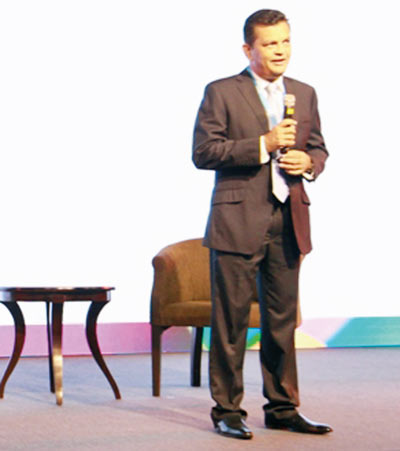Watson to the rescue : Start-ups slated to elevate to the next level

Chrishan Fernando, Country General Manager, IBM Sri Lanka, addresses the gathering.
Think about it. Everything in life is a trade-off. Where to build your dream home, which outfit to wear, which hospital to admit to, what target market to reach, etc – Whether in personal life or in business, one has to make choices. Chetan Naik, Vice President – Enterprise and Mid Market, IBM India/South Asia visiting Colombo this week says that IBM’s Watson programme makes these decisions easier for you. Fresh after a hectic IBM – Business Connect 2016 at the Cinnamon Grand on Monday which brought together IBM and their Sri Lanka clients to explore new technologies and brainstorm new trends that can revolutionise the technology market for the next level, Mr. Naik is surprisingly unruffled and brimming with energy. It’s just another day at the office for him when he sits down for a chat with the Business Times. The discussion was based on how IBM is committed to build a strong ecosystem of startups, empowering them to fuel innovation in the local market by announcing its flagship Global Entrepreneurship Program (GEP) in Sri Lanka, but he wants to rewind in a bid to explain how it all started.
Watson who?
IBM which is leading transformation through multiple generations started this journey by foraying into natural language programming, he says. This happened when IBM forayed into natural language programming through Watson. “Watson uses natural language processing to understand grammar and context, comprehend complex questions, assess all possible meanings and establish what is being asked and presents answers and solutions, based on supporting evidence and quality to information found.” As non techies, we wonder who Watson is. Well ‘it’ is a set of algorithms, he says explaining that this programme harnesses all of the published data and gain insights to make better business decisions or even better personal decisions for users in their daily lives.
There’s an overwhelming amount of data on digital systems that continue to grow exponentially everyday and Mr. Naik adds that some 80 per cent of this is in unstructured form. There’s no humanly possible way that one can sift through all these. With a wealth of enterprise-critical information being captured in natural language documentation of all forms, the problems with perusing only a limited number of papers using the user’s two or three key words, isn’t enough anymore. There is increasing interest to have enterprise computer systems intensely study the breadth of relevant content to more correctly answer and justify answers to user’s natural language questions.”
This is where Watson steps in to give meaningful insight to all the madness. Watson does this through application program interface (API) and draws insights by tapping into massive volumes of unstructured data and analyses unprecedented amounts of them drawing insights in a matter of minutes. “These insights allow companies and individuals to make better decisions, with more complete knowledge,” Mr. Naik says. As an example, he says that one company in the US is using this to draw insights from massive amounts of medical journals, helping doctors make better treatment counsel for their patients.
Speech-to-text facility
“If a HR Manager receives a multiple amount of resumes for instance, he can feed what the company is looking for in a particular person and then peruse the best fit.” Similarly Watson can be used for health such as assisting oncologists to determine cancer. Instead of reading reams of journals with new information, they can get Watson to troll through necessary information or get a pattern after which they can administer care.
Mr. Naik adds that Watson is designed to make advanced and predictive analytics easy to acquire and used by anyone. Another example is Watson’s Speech-to-Text service, which immediately catches my attention. Apparently this is the ideal thing for journos as it eliminated typing – truly the next gen fad.
As new capabilities such as these continue to surface, more and more startups are turning to cognitive (acquisition and understanding of knowledge) computing with Watson, he says adding that as cognitive computing offers capabilities not previously available to the marketplace, by tapping into this technology, and applying it to various different industries, startups are rapidly bringing new value to the marketplace.
Mr. Naik says that startups looking to get a competitive edge are realising the need to stand out in the marketplace by offering capabilities that their competitors cannot and Watson provides just the means to do that.
This may sound like science fiction, he concedes, but for the past few years, we have the IT industry evolved around ‘Cloud’ capabilities in new forms and according to more than 300 global venture capitalists, private equity and growth equity investors this year, they’ve largely been investing in tech companies, especially with cloud capabilities. In this context, IBM too is committed to provide start-ups with the tools they need to build and capitalise on the next generation of apps for the cloud, he adds.
Watson offers entrepreneurs and startups easier access to people, technology and collaboration-with which they can build new companies and create new capabilities that will greatly benefit businesses, the global economy, and improve people’s lives, Mr. Naik says. To date, according to Mr. Naik, IBM has engaged with more than 8,000 start-ups through entrepreneur initiatives and is registering an average of 19,000 new developers each week. It has partnered with 2,400 independent software vendors (ISVs) to help drive IBM Cloud revenue.


